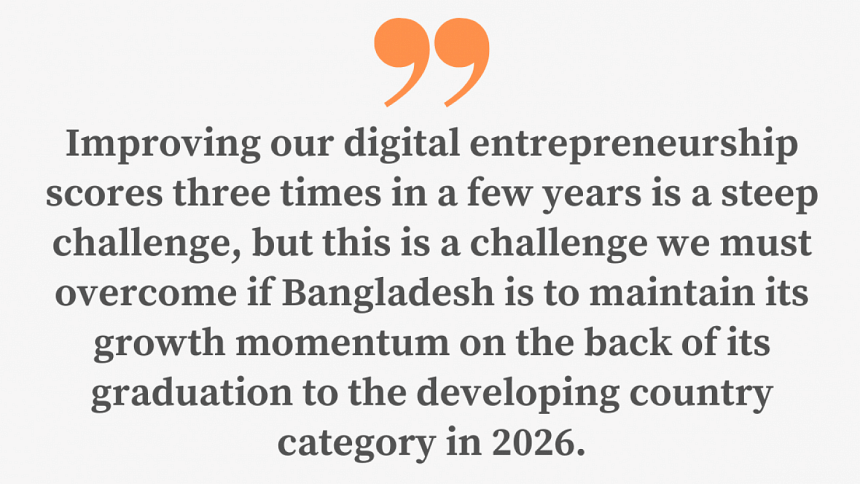How Bangladesh can boost digital entrepreneurship

In table talks these days, one cannot escape passionate discussions on how technology start-ups – budding business ventures that start with a few dreamy founders offering innovative products or services based on cutting edge technologies – have been spawning young billionaires all over the world. From Airbnb's Brian Chesky, TikTok's Zhang Yiming, Facebook's Mark Zuckerberg to Flipkart's Sachin Bansal, Snapchat's Evan Spiegel, and Uber's Ryan Graves, their innovative ideas and gumption led to them becoming self-made billionaires in their 20s.
Start-ups have created enormous wealth for themselves and the economies they operate in over the past two decades, and are increasingly seen as key drivers of growth and social equity. Given their outsize influence on socio-economic transformations, the Asian Development Bank (ADB) came out with a special update to their Outlook 2022 on Entrepreneurship in the Digital Age in September this year, where it developed a Global Index of Digital Entrepreneurship Systems (GIDES) that "measures the quality of an economy's environment for digital entrepreneurs." In this first ever ranking of 113 countries for digital entrepreneurship, Singapore is at the top, and is the only Asian economy in the top 15 denoted as "Leaders" in the ranking. Other Asian nations in the top 40, denoted as "Followers" and "Catchers-up", are Bahrain, China, Israel, Malaysia, Saudi Arabia and South Korea. South Asian countries do not figure prominently as all of them came under the bottom category of "Tailenders". Bangladesh, ranked 96th, is smack in the middle of all South Asian countries in the study, with India and Sri Lanka above and Pakistan and Nepal below.
This ADB study reports that digital entrepreneurs outperform non-digital peers in terms of innovations and job creation. It found strong links between facilitating institutions and dynamism in entrepreneurship, and also reported that entrepreneurial vibrancy is sapped by corruption.
It is disheartening to see that Bangladesh, along with other South Asian countries, couldn't find a place in the top third of the ranking in this very telling study. Looking at the details of the ranking criteria, we find that Bangladesh did very poorly in four of the eight areas – namely informal institutions, market conditions, human capital and formal institutions. If we could alleviate our positions in these areas to the average level of the other four – namely physical infrastructure, knowledge creation/dissemination, finance and networking/support – then we could improve our ranking to be at par with India. This is not a very big ask.

If we could highlight improvements in institutional support to the digital economy, that would mitigate shortcomings in formal institutions and help us score reasonably higher than the current paltry 10 out of 100. Similarly, the market conditions score could be improved by sharing with ADB the information on recent high growth in e-commerce ventures, especially women-founded Facebook commerce initiatives. The e-BIN registration drive of the commerce ministry is helping bring such women entrepreneurs to the mainstream and, at the same time, helping reduce the risks of fraudsters masquerading as e-commerce entrepreneurs.
Bangladesh's very low score in human capital is mysterious. While it is true that technical human resources skilled in the latest tools and technologies take time to groom, there are plenty of technical graduates to go around. Bangladesh has one of the largest pools of engineering graduates in the world and even in South Asia. These graduates have the fundamental academic learning to be trained in the required tools easily. Technical managers take longer to groom and can be a challenge for a start-up. The ICT Division, in collaboration with industry associations, is addressing the human resource issue in a persistent manner and has many well-funded projects to overcome the lack of ready availability of technical and managerial labour pools. With these highlighted, the human capital score can certainly be improved from a lowly 8.5.
That leaves tackling the abysmally poor score of 2.1 in informal institutions. This is largely dependent on business and entrepreneurship culture and is much more difficult to contend with. However, there are a great many private initiatives for incubation, mentoring, competition and pre-seed financial support in the country. If the government – particularly the ICT Division – takes initiative to identify all such measures and helps channel such efforts to the most promising start-ups, with a focus on women and minority entrepreneurs, then here also we can improve our score substantially.
With these so-called "low hanging fruit" initiatives, Bangladesh's ranking can be at par with India's, and that should be our target for the 2023 GIDES. But our efforts should be steered towards getting us moved to the top half of the ranking, above Vietnam and Thailand, by steadfastly improving our scores on average by three times from the current average in five years or less.
Improving our digital entrepreneurship scores three times in a few years is a steep challenge, but this is a challenge we must overcome if Bangladesh is to maintain its growth momentum on the back of its graduation to the developing country category in 2026.
The GIDES report concludes, "Policymakers have plenty of scope to foster a more entrepreneurial Asia full of dynamic entrepreneurs who innovate, create jobs, and propel growth." This is more so for Bangladesh, which has had a whirlwind journey since 2009 towards digitalisation, and has been recognised by international institutions, such as the International Telecommunication Union (ITU) and the World Summit on the Information Society (WSIS), on several occasions. It is time we brought home the harvest of all the policy and piloting efforts for "Digital Bangladesh" in the last decade, and really allow our spirited entrepreneurs to rise to the call for digital innovations and scale up their enterprises to get young millennials on board for a thriving Bangladesh.
Habibullah N Karim is a digital entrepreneurship promoter, investor and writer.

 For all latest news, follow The Daily Star's Google News channel.
For all latest news, follow The Daily Star's Google News channel. 









Comments